|
Preparations for War
By the late 1930s it
seemed that war would be inevitable and so
Dudley followed the Home Office order to dig
trenches, so that 10 percent of the
population could take cover during air
raids. In 1938, members of the ARP (Air Raid
Precautions) were given the task of digging
tranches on open land at Woodside and
alongside Birmingham Street and Fisher
Street in Dudley. Trenches were also dug at
Netherton.
Appeals were made for
volunteers to help carry out the work, which
was done by around 200 people. The trenches
were 5ft. 6 inches deep, 4ft. 6 inches wide
at the top and 2ft. 6 inches wide at the
bottom. The sides of the trench were
reinforced with wire mesh and wooden posts.
The spoil from the trench was used to form a
protective pile of rubble, eighteen inches
high, on either side of the trench.
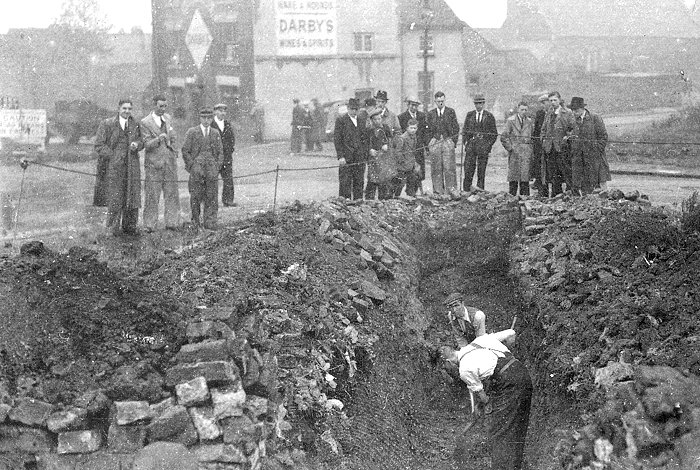
Digging a trench in
Birmingham Street.
The Air Raid Wardens
Service had been set up in 1937 to report
incidents, reassure the public, provide ARP
advice, extinguish small fires, administer
first aid and investigate reports of
unexploded bombs.
In September 1938, gas
masks were supplied to schools and adults
were asked to collect a gas mask from a
local polling station or the ARP Centre in
Stafford Street. Over 44 million gasmasks
had been issued nationally by the outbreak
of war in September 1939. Air raid shelters
were distributed from 1938 and communal
shelters were built for people who hadn’t
the outside space needed to erect their own
shelter. From June 1939, the ARP ran
anti-gas courses and formed decontamination
squads, in case the enemy would spray gas or
drop bombs containing gas.
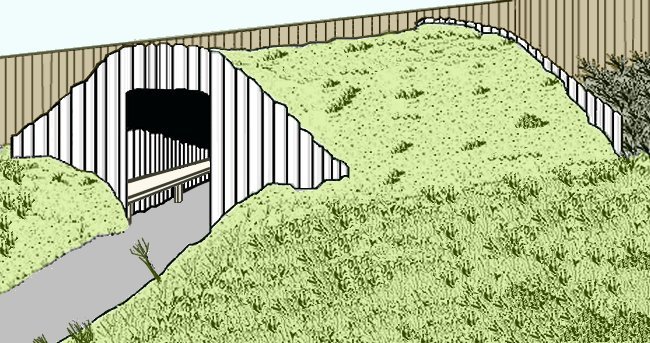
An Anderson air raid
shelter in a back garden.
In order to cope with
future shortages, people were encouraged to
plant vegetables on any spare land that they
possessed and the government provided
information on how to use food more
efficiently and still keep healthy.
In August 1939,
Parliament passed the Emergency Powers
(Defence) Act that allowed the issue of any
controls or regulations that were deemed
necessary. This was extended in 1940 and
contained wide-ranging powers including
provision for punishment, detention without
trial, the requisitioning of land and
property for military use and food
rationing. From the 1st September, 1939, the
blackout was enforced, where curtains,
cardboard or paint were used to prevent
light escaping from windows, which could be
seen by enemy bombers. Anyone not complying
could be fined. People were also recruited
into a variety of essential positions such
as Air Raid Wardens and the Home Guard,
which was formed in 1940. On the 13th May,
1939, a National Service recruiting week
began, which culminated in a parade given by
the regular and territorial armies and the
ARP services.
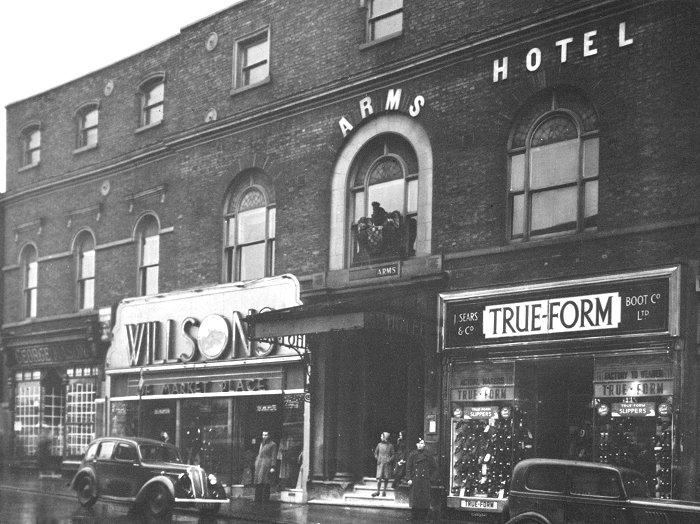
The Dudley Arms Hotel
in 1940 when place names were removed to
confuse enemy paratroops. |
|
The Declaration of
War
When war was declared at the
beginning of September, 1939, Dudley was well prepared.
People had already been recruited to the ARP, including
200 women who became ARP ambulance drivers, the civic
buildings had been sandbagged and early closing was
introduced in most shops.
|

On Saturday the
16th December, 1939, the Co-op opened
one of Dudley's leading department
stores on the corner of High Street and
Vicar Street. The lower ground floor
included an electrical goods department
featuring the latest wireless sets, a
hardware department, with paint and
wallpaper etc., a sports goods
department and a crockery and cutlery
department. Items on sale on the ground
floor included menswear, jewellery,
perfumery, dress materials, needlework
and haberdashery, knitwear, and soft
furnishings. The first floor included
women and children's clothes, underwear,
a section for babies, and a shoe
department. On the second floor was the
furniture department, lino and carpet
department and the café.
The building is now occupied by
Provision House. |
|
In July 1940, on four consecutive
Monday evenings, the mayoress, Mrs. B. T. Horwood and a
committee of ladies, entertained wounded soldiers, first
to tea, then to a concert at the Hippodrome.
In 1940, after the formation of the
Mayor of Dudley’s Spitfire Fund on the 23rd August, Dudley raised a large sum
of money to help to finance the building of Spitfires. A fundraising committee was
formed to plan the activities which included house to
house collections, competitions, auctions and a week of
events from the 7th to the 14th October, ending with an
all-star concert at the Hippodrome, starring Flanagan
and Allan. During the week of activities, a captured
German Messerschmitt was displayed in the council house
courtyard. Visitors could sit in the cockpit in return
for six pence, which went towards the fundraising. At
the end of the week, a total of £7,400 had been raised,
which would pay for one and a half Spitfires.
From 1940 there were more air
raids. The German bombers dropped high explosive devices
and incendiary bombs that could quickly start a fierce
fire. People were encouraged to volunteer as fire
watchers, which were trained by the air raid wardens.
Employees in factories were also asked to become fire
watchers. By the end of the year, this became
compulsory.
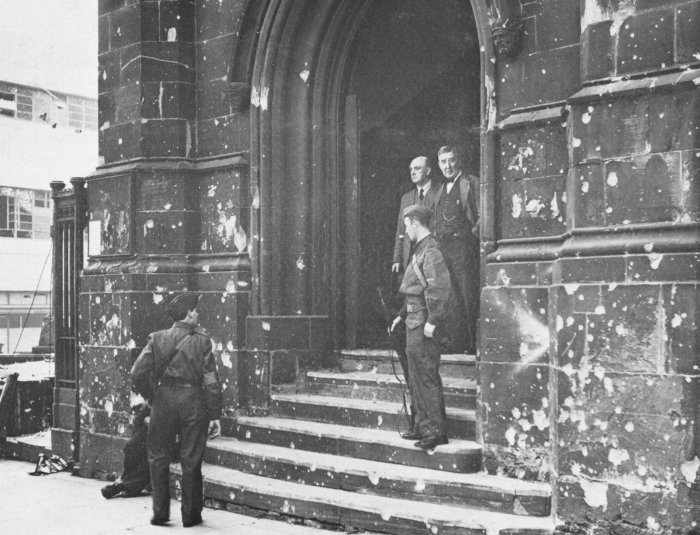
Damage to the stonework on St.
Thomas's Church after a nearby bomb exploded on the 7th
September, 1940.
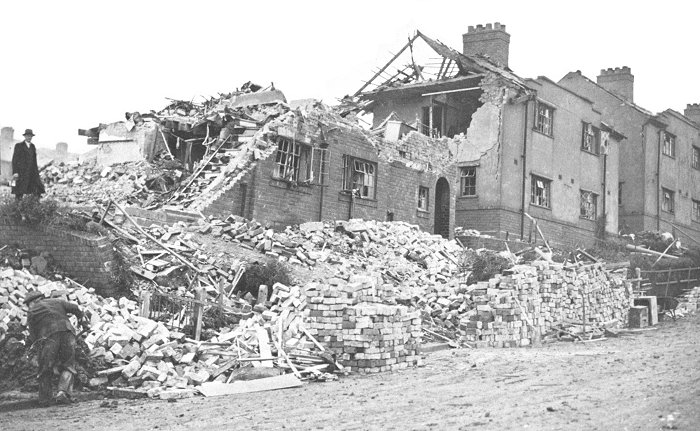
Bomb damage on the Grace Mary
Estate, Tividale. In November 1940.
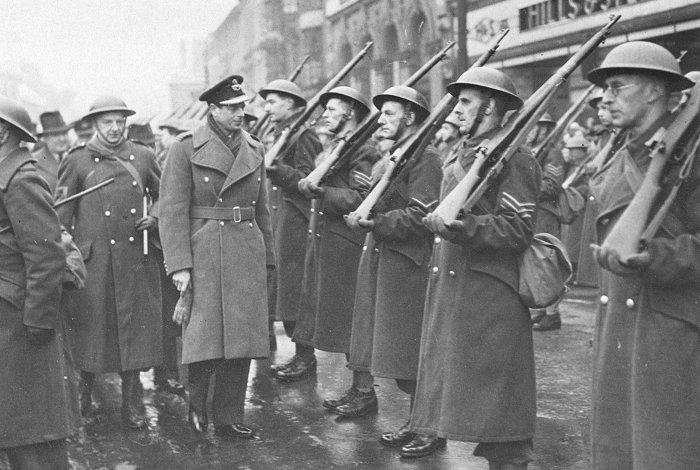
The Duke of Kent, inspecting the
Home Guard in Dudley Market Place, on the 19th December,
1940. |
|
Two British Restaurants opened in
Dudley. The restaurants were established by the Ministry
of Food and known as communal feeding centres. By 1943
there were over 2,000 British Restaurants which offered
affordable, nutritionally balanced meals, to help people
to supplement the meagre food rations. They were staffed
by volunteers from the Women’s Volunteer Service and
allowed people to eat-out, or take food away to eat at
home.
Salvage campaigns were introduced
in 1941, in which scrap metal was collected, including
wrought iron railings which were taken down to be used
as scrap. Large amounts of waste paper were also
collected. In 1942, Dudley collected 126 tons.
Ernest Bevin
introduced conscription for women in 1941. Anyone
between the ages of 18 and 50 who had no children under
the age of 14 was required to do work of national
importance. This included joining the Women's Royal
Naval Service, the Women's Auxiliary Air Force, the
Women's Auxiliary Territorial Service, the Land Army,
working on war work in factories, or joining the nursing
services. Nurseries were established to help women with
childcare and in 1943 school meals were
introduced for children.
On the 26th February, 1942, the
king and queen inspected around 2,000 civil defence
personnel at Dudley cricket ground. Around 10,000 people
came to watch the event. During the early 1940s, both
Dudley Girls’ High School and Dudley Grammar School sent
children to harvest camps to help with the harvest,
during the shortage of labour.
There was a shortage of coal miners
and so between December 1943 and March 1948, young
British men were conscripted to work in the coal mines.
They were known as 'Bevin boys'.
During 1942, more air raid shelters
were built at Dudley to improve the civil defence
facilities. There were severe shortages and so people
were asked to use less water and take fewer baths,
clothes were rationed, newspapers were restricted to
four pages and petrol was only available for essential
use.
After the defeat of the Luftwaffe, the air raids
ended. Dudley had 358 air raid alerts, but only a small
number of bombs were dropped. One of them landed near
St. Thomas’s Church, on the 7th September, 1940,
destroying the Three Swans public house, on the opposite
side of High Street (number 177). Some slight damage
from the explosion can still be seen today in the
church’s stonework. There was one fatality in Dudley, a
Mrs. George Marlow.
In January 1944, Rab Butler’s Education Act promised
free secondary education for all. |
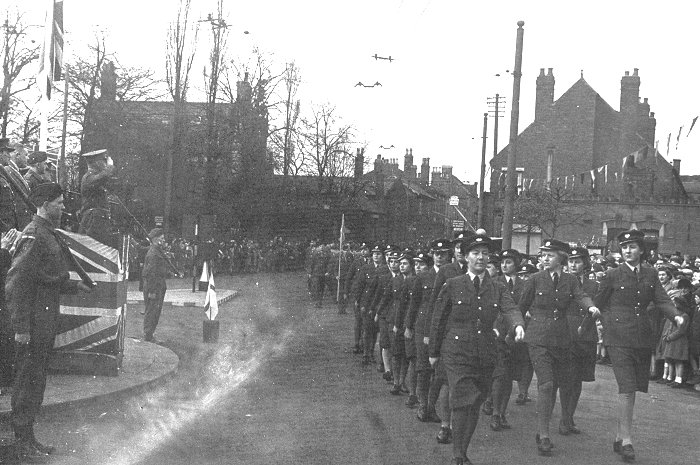
The march at the beginning of Sedgley's Salute
the Soldier Week, on the 17th April, 1944.
|
After the D-Day invasion of Europe
in 1944, civil defence duties were reduced, the local
Home Guard disbanded at St. Thomas’s Church on the 3rd
December, the blackout ended and the streets were again
lit at night. The war in Europe ended on the 8th May,
1945 and was declared at an end when Japan formally
surrendered on the 2nd September. There were massive
celebrations, street parties and Churchill dissolved
parliament. Many changes would soon follow with the
landslide victory of the Labour Party and the
introduction of increased nationalisation and the
creation of the welfare state.
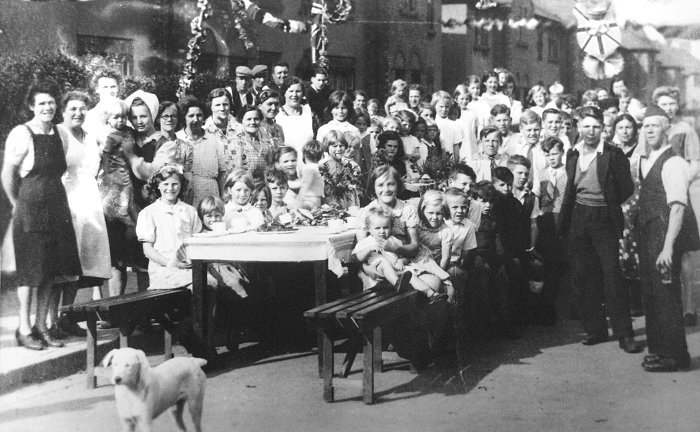
A VE Day street party that was
held in Lowe Avenue, Darlaston. Courtesy of Mavis Young.
Like many of the local factories in
the early 1940s, the Co-Operative Wholesale Society (CWS)
warehouse in Hall Street, which supplied many local
Co-Op stores, had its own fire brigade. The CWS National
Works Fire Brigade competed in the National Fire Service
annual competitions and on the 8th July, 1944 won the
Dudley divisional competition at the Revo Sports Centre.
Amazingly the fire brigade’s room at the factory, now
occupied by the Alan Nuttall Partnership, was
rediscovered in 2016, still in its original condition
with the old uniforms, gas masks, canvas hoses and fire
pump trailer, with 'CWS DUDLEY' lettered in gold on the
front. |
| |
|
Read about the
Post War Years |
 |
| |
|
 |
|
 |
|
 |
Return to the
Inter War Years |
|
Return to
the contents |
|
Proceed to the
1950s, 60s and 70s |
|